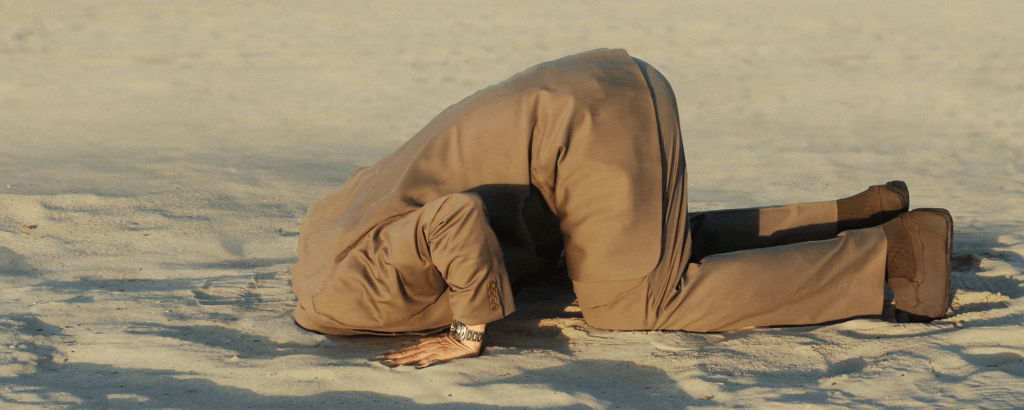The Netflix movie “Don’t Look Up” is polarizing. If you look at the various rating portals on the Internet, you will notice that there are only a few differentiated ratings – but the number of top and flop ratings is high in each case. This phenomenon also describes the state of our society. While some people leave no stone unturned in their efforts to counter the climate catastrophe, others consistently reject every measure. The chasm between these two groups is getting deeper.
Denying the disaster so you don’t have to change
“Don’t Look Up” tells the following story. A meteorite is hurtling toward the Earth. Scientists discover that and warn mankind, but instead of actively doing something against the crash, most people decide to no longer look at the sky. Ultimately, the world ends.
The Grass Sucker explains how to do it constructively
It doesn’t have to come this far, says Jan Hegenberg, one of Germany’s most successful sustainability influencers, better known on social networks as “Der Graslutscher (The Grass Sucker)”. In his latest book, “Weltuntergang fällt aus” (“End of the World Drops Out”) (on the SPIEGEL bestseller list for weeks), he details why we’re not as far away from solutions as we sometimes think – thanks largely to technological progress. Hegenberg relies on a change of perspective, coupled with optimism: “In Germany, people are very good at first discussing what could go wrong instead of imagining how nice it would be if it worked. I can’t think of any major achievement that was 100 percent perfect from the start. Readjustment will certainly also be necessary in the energy transition, but maybe we’ll give it a try in the first place.”
Futurologist Horx recommends: A look back from the future
A change of perspective is also recommended by the Frankfurt-based futurologist Matthias Horx. His Zukunftsinstitut (Future Institute) publishes an annual report on the future. For once, the 2022 edition does not look ahead, but from the future back to the present. Horx takes us to the year 2050, from where we can see what all works: Renewable energies, green consumption, and sustainable technologies. “This is how we manage to stop lamenting the problems and impossibilities,” Horx says. “We say goodbye to hypnotic catastrophic fear. And we start thinking – and acting – constructively from the future.” Horx explains, “Our Earth does not have a normal state. And thus neither is there a state that we can maintain.” Nature, according to Horx, means change.
Displacement is a normal behavior
There is an organization whose core competence is to explore how people deal with multiple crises and to look for solutions, “Psychologists for Future”. The psychotherapists and psychologists want to help promote emotional handling and constructive action in the face of crisis. Felix Peter, the spokesman for the organization, explains in an interview with Swiss radio why people look away. One key aspect, he says, is fear. “It is virtually our threat detector,” says Felix Peter, “without fear, we would hurt ourselves more and die sooner. Unfortunately, fear often works in humans in such a way that only short-term threats have a positive effect on us and give us energy. It doesn’t work so well with long-term risks that don’t cause concern or are too big. There we are rather in a displacement.”
We must learn to live with the crisis mode
Displacement in itself is not always a bad thing, says the psychologist, “we displace all day to cope with the complex demands of everyday life. Otherwise, our brains would be overloaded. For longer-term threats, however, ignoring is not effective.” That’s why, Peter says, “we always manage at this level to suppress warnings from science, politics or civil society.” He warns against “crisis permanence”: “Most of us won’t live to see how we get out of crisis mode.” Accordingly, we must learn to live with it without consistently suppressing the threat.
Politicians rely on delaying tactics
It doesn’t make it any easier that no constructive approach to the climate crisis prevails in politics either. Anita Habel, a psychologist who is also an active member of “Psychologists for Future,” explains the phenomenon in an interview with the RIFF magazine: “Attention is focused on measures that are inadequate. At the same time, the impression is created that they are sufficient and that major changes are therefore not necessary. Very central here is the focus on technical solutions: All we have to do is develop the right technologies and become more efficient – and then everything will be great. This is not the case. This delay argumentation is to be observed in many politicians’ speeches.“
Experts recommend a pretty picture as a vision
Just like influencer Hegenberg and futurologist Horx, psychologist Habel recommends a change of perspective to motivate people to get involved: “We need a positive vision: What could this new sustainable world we want to live in look like? How can we imagine it better? Instead of always emphasizing the negative consequences and renunciation, we need to find a positive image that drives us,” explains Anita Habel in an interview on brigitte.de.
Behavioral researcher sees responsibility for politics and business
How can more people get inspired to live sustainably? The US psychologist Wendy Wood from the University of Southern California in the USA is dealing with this topic. In the ZEIT newspaper, she appeals to politicians and business leaders to change the framework conditions: “In the U.S., it’s largely economic interests that drive us to continue eating unhealthy things or driving polluting cars because it’s made easy and costs little. There’s a lack of political will to make it easy for many people to eat healthier and live greener.” Until that political will is there, Wood said, it’s up to us to make some changes ourselves – so that the bad ending from the Netflix movie “Don’t Look Up” doesn’t become reality after all.
 English
English Deutsch
Deutsch




